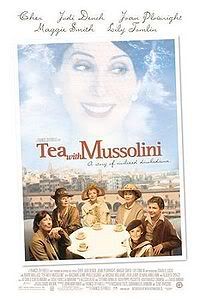
The adventure continues as I endeavor to indulge in some of the first films I cleaned up after. "Tea With Mussolini" holds no anecdotal tales for me, other than the fact that I remember the damn thing playing forever. The reason it played so long? Well, working at Baxter has taught me one important lesson: people in the Highlands love to embrace anything British. Several regular customers don a cockney accent that makes me repress a strong urge to slap them until their Fairdale drawl resurfaces. Anyway, with Maggie Smith, Joan Plowright and Judi Dench in the cast, how can the film not last on screen until the end of time on the dollars on the "females forty years old and up" crowd?
Set in Italy on the cusp of WWII, the film quickly introduces us to a cavalcade of eccentric dames: Arabella (Dench), a screeching crone with a disheveled nest of hair and a penchant for art. Lady Hester (Smith), the affluent, acerbic bitch of the clique. The tomboyish Georgie (Lily Tomlin), slumming in Florence rather than the suburbs of New York. Elsa (Cher), a garish American who collects counterfeit art and husbands with the same level of credibility. And lastly, Mary (Plowright), an English nanny determined to bring up a young Italian by the name of Luca to be a proper English gentleman. Together, all these ladies...well...
The movie had me hooked from beginning to end with great acting by the cast, but I'm not sure what the primary story of the film was supposed to be. There were three distinct plots occurring simultaneously that intersected with one another when the occasion suited them.
1. A coming-of-age tale for Luca as he develops under the watchful eye of Mary and her friends and suffers puppy love fur Elsa (*shudder*).
2. A light-hearted look at the indefatigable nature of the British spirit, displayed through the "ever proper" behavior of the aforementioned ladies as the world they once knew comes crumbling down about them (both figuratively and literally).
3. The "true story" of an American woman (Elsa) who was misunderstood and despised by the British women. In the end, they come to realize that she helped save their lives at her own personal expense and they pull together to help her get back to America.
Had the feature focused primarily on one of these tales, it would have ended up a fantastic film. It did not though, and as a result, the final product never gels as a solid story.
Watch the Trailer

No comments:
Post a Comment